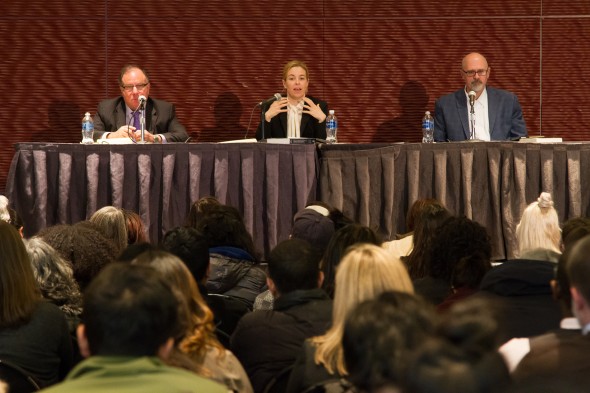Campus Conversation panel examines Trump administration, constitutional law

A panel of experts at the Campus Conversation event Feb. 1 discussed the Trump administration and constitutional law. (Photo: Vibhu S. Rangavasan)
Is the U.S. Constitution equipped to prevent our democratic institutions from backsliding into authoritarian ones?
Not really, said comparative constitutional scholar Tom Ginsburg at a Campus Conversation event Feb. 1. The event, sponsored by the Office of the Provost, is the first of three conversations that will take place over the course of the semester. This month, legal scholars from two Chicago law schools talked about the Trump administration, immigration and constitutional law.
An open forum related to the Campus Conversation event takes place from noon to 1 p.m. today in the Illinois Rooms, Student Center East.
Ginsburg, from the University of Chicago, emphasized that Americans’ knowledge of the U.S Constitution is “not really great.” The Leo Spitz professor of International Law provided a brief overview of common triggers and warning signs of democratic backsliding. Experts have spotted some in the United States, Ginsburg added.
Abigail Milloy, a graduate student who attended, said the talk was insightful.
“The panelists weren’t there to make us feel warm and fuzzy,” she said. “They were willing to provide real information about risks, solutions and actions that we can take.”
Erin Delaney, associate professor of law at Northwestern University Pritzker Law School, explained and discussed the executive orders signed by President Trump in January that affect immigration policies. She discussed new enforcement priorities of the Trump administration, which target undocumented immigrants who have been charged of, convicted with, or have committed acts that constitute a chargeable criminal offense. Delaney also explained how states or sub-state entities can help with immigration enforcement, what sanctuary cities are and how Chicago’s status could affect the budget, noting that the city’s sanctuary status puts only 0.3 percent of Cook County’s budget at risk.
Daniel Rodriguez, dean and Harold Washington Professor at Northwestern Pritzker Law School, shared his thoughts about Trump’s nomination for the U.S. Supreme Court, Judge Neil Gorsuch, who Rodriguez thinks is likely to get the seat.
“On the one hand, he’s a very conservative guy, no doubt about it, but on the other, his brand of conservatism may be one that will — in the interest of protecting the separation of powers — be a check along with these other justices against the possible aggrandizement of power on the part of the president,” he said.
But the panel’s final point was that democracy can’t be taken for granted—it’s up to the people to be informed and involved enough to make a difference.
“Call your congressman every day, and get everyone out to vote in 2018,” Ginsburg said.
The next Campus Conversation in March will feature Susan Herman, president of the American Civil Liberties Union, who will discuss the criminal justice system.
